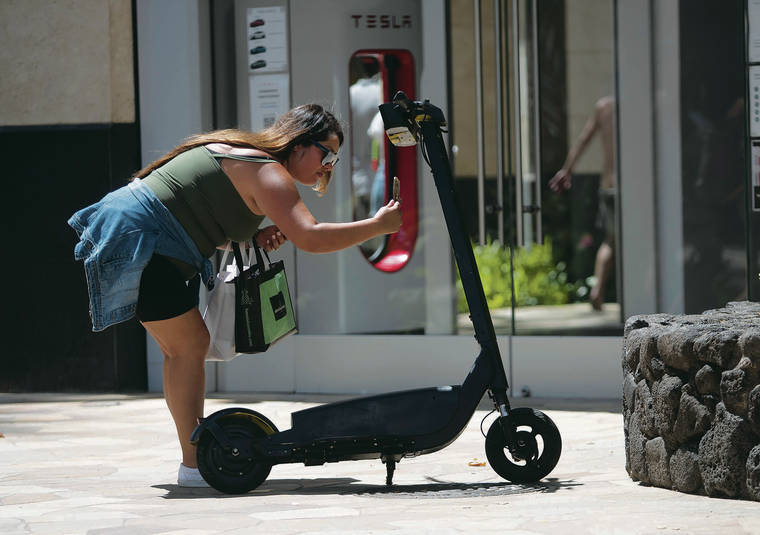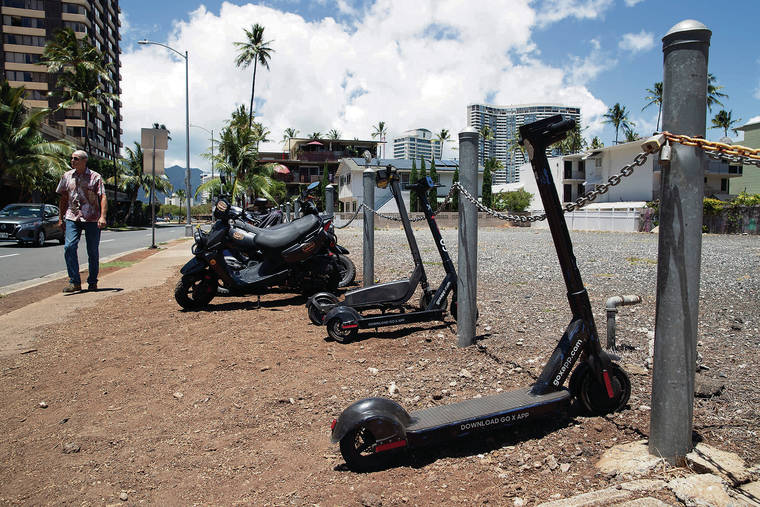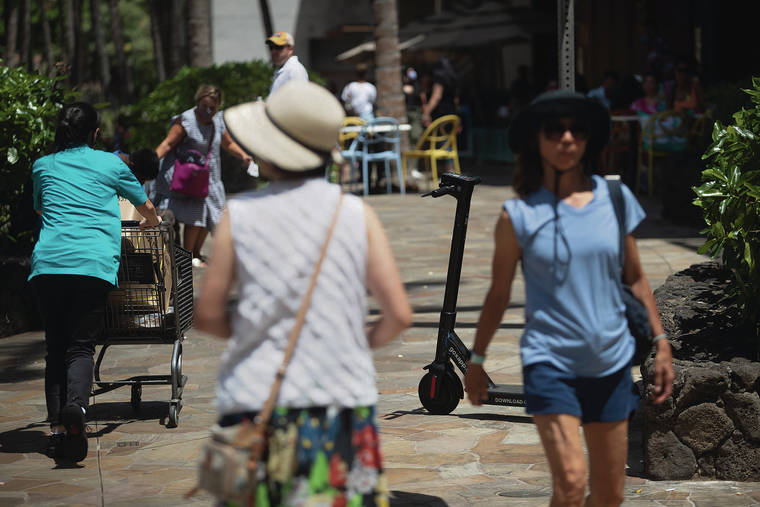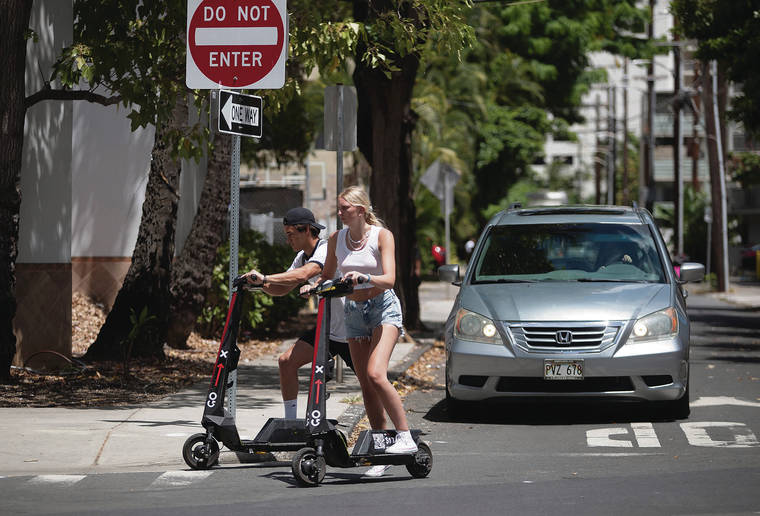Electric foot scooter industry charged up by new Hawaii law

CINDY ELLEN RUSSELL / CRUSSELL@STARADVERTISER.COM
A woman tried to scan a QR code on a scooter left on the sidewalk along Kalakaua Avenue.

CINDY ELLEN RUSSELL / CRUSSELL@STARADVERTISER.COM
A couple of GO X scooters were parked along Niu Street in Waikiki on Friday.

CINDY ELLEN RUSSELL / CRUSSELL@STARADVERTISER.COM
A Go X scooter was parked in front of the International Market Place in Waikiki on Friday.

CINDY ELLEN RUSSELL / CRUSSELL@STARADVERTISER.COM
A new state law limits electric foot scooter speeds to 15 mph. A pair of Go X scooter riders made a turn onto Lili‘uokalani Avenue in Waikiki on Friday.




Hawaii lawmakers and Gov. David Ige have enacted a law to regulate electric foot scooters in the state, three years after an e-scooter rental business battled with the city over a chaotic short-lived operation.
The new law limits scooter speeds to 15 mph, prohibits riders under age 15 and requires a one-time registration costing $30, among other things, while leaving it up to counties to establish other regulations that include where such vehicles can be ridden and parked in public places.
House Bill 72, signed by Ige on July 1, also specifies that state laws governing moped use, including required vehicle licensing, don’t apply to electric foot scooters, which city officials had contended was the case in 2018 as part of their effort to stop e-scooter rental firm Lime from operating.
The new law is expected to foster expansion of personal mobility options that are more friendly to the environment than cars, and possibly lead to a proliferation of electric scooter-sharing businesses.
However, such expansion may be a long way off, given that the city Department of Transportation Services considers the new law only a “first step” toward incorporating electric foot scooters into Honolulu’s traffic code.
“As required by the law, the counties must first adopt ordinances to regulate operations of these scooters within the statewide framework,” the agency said in a statement.
Don't miss out on what's happening!
Stay in touch with breaking news, as it happens, conveniently in your email inbox. It's FREE!
DTS added that it is developing a draft bill for City Council consideration to establish regulations including safety requirements and rules for operations on Oahu.
The agency also said establishing the new state law to regulate electric foot scooters has been a DTS priority for several years.
Similar measures to HB 72 failed to win lawmaker approval in each of the past two years despite encouragement from industry supporters and county officials.
The recently enacted legislation drew supportive testimony from a few scooter rental businesses, including Lime, during hearings at the Legislature. Another industry operator that endorsed the measure, New York-based Helbiz Inc., said it intends to enter the market in the near future.
Hawaii’s new law also was celebrated by one electric foot scooter rental business that has been operating in Waikiki since February despite the city’s position that riding electric foot scooters in public places remains illegal.
The company, Go X, said it plans to expand on Oahu and to the neighbor islands following what it called a successful trial limited to Waikiki conducted with the city’s awareness.
Alex Debelov, CEO of San Francisco-based Go X, said company representatives presented their case to city officials in the transportation department, mayor’s office and police department before launching to discuss the prior administration of Mayor Kirk Caldwell using “far-fetched” reasoning that state law specific to mopeds applied to electric foot scooters.
DTS said it has not permitted, approved or otherwise sanctioned Go X operations.
Debelov contends that his company is on solid legal footing with regard to the city’s position that electric foot scooters were previously illegal if they didn’t comply with moped regulations, and he noted that it previously wasn’t possible to register an electric foot scooter with the city like a moped.
“It isn’t a moped,” he said.
Unlike Lime three years ago, Go X distributes its scooters from docking stations at other businesses, including hotels, shopping centers and other vehicle rental establishments that receive income from Go X.
Lime had a “dockless” operating model where customers could pick up and leave its scooters anywhere on public property, which drew the ire of city officials who deemed such placement illegal and impounded Lime scooters obstructing pedestrian thoroughfares on public property.
City officials in 2018 said a state moped law required electric foot scooters to be registered and licensed while another state law prohibited parking a scooter on any part of a street, including sidewalks, for the purpose of selling the vehicle or any service therein and thereby creating a hazardous condition or public nuisance.
Lime ceased its operations with about 200 scooters in Waikiki, Ala Moana and Kakaako after a week of jousting with the city and having half its fleet impounded.
Honolulu Police Department spokeswoman Michelle Yu said officers in Waikiki issued numerous warnings and citations for riding on the sidewalk after Go X scooters were first introduced, and that officers also recovered “numerous” unattended scooters left on public property.
More recently, the number of warnings and citations has decreased, Yu added.
Debelov said instances of Go X scooters being left on public property are rare, and that customers incur a $25 to $30 charge for not returning a scooter to a dock unless a scooter runs out of battery power. In both cases, he said, scooters are retrieved by Go X promptly.
Go X said customers have taken about 50,000 trips using its fleet that began with 100 scooters and grew to about 150. Customers are charged $1 to unlock a scooter and 50 cents to 88 cents per mile depending on demand, with longer-term use plans available.
Debelov cited a 2019 report by traffic data analysis firm INRIX that concluded Honolulu has the most potential among major U.S. metropolitan areas for micro-mobility platforms including bike and scooter sharing to reduce automobile trips given the city’s warm climate and high proportion of short-distance travel.
“It has been an incredible market,” he said. “It’s been very, very, very, very popular. From our perspective, it’s a good thing.”




